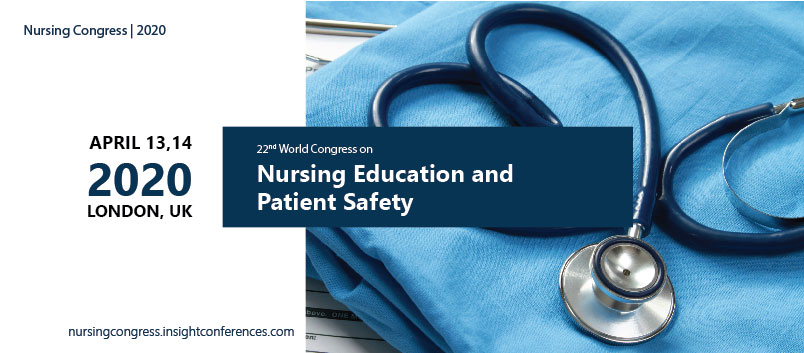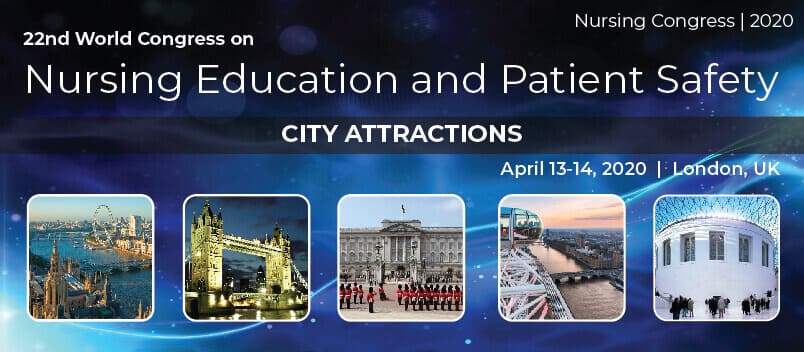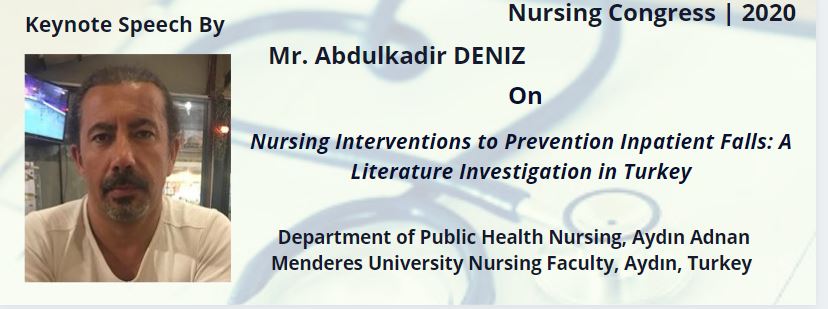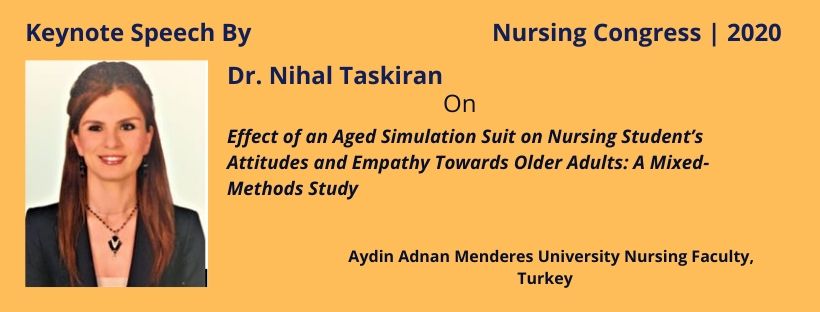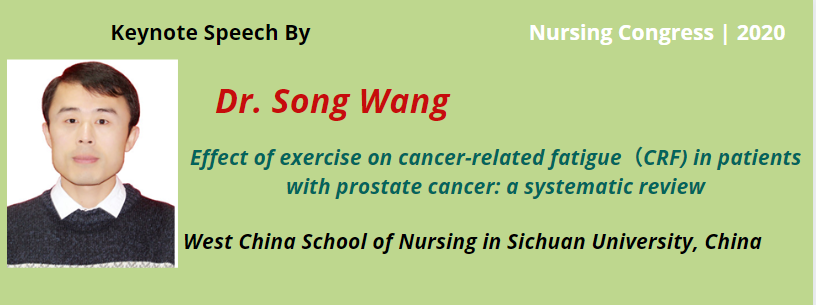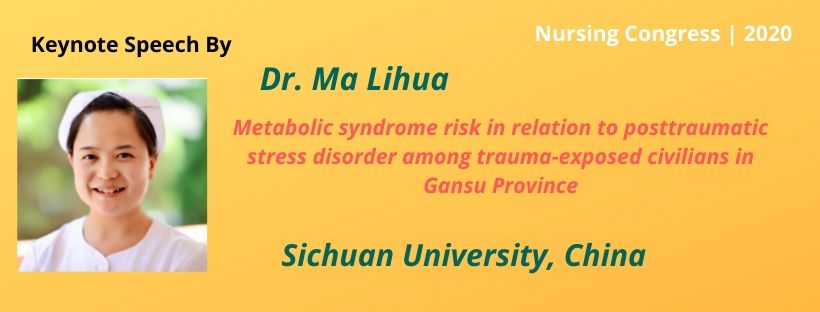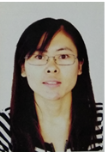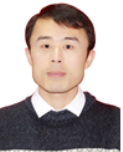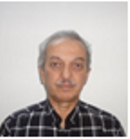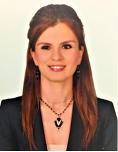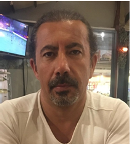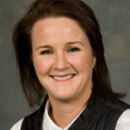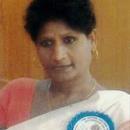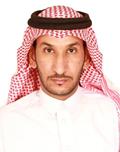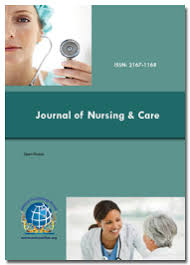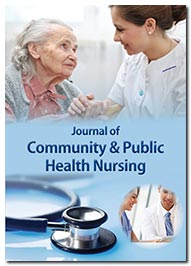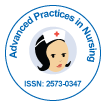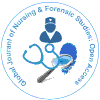Theme: Innovative Ideas and Approaches in Nursing Education and Patient Safety
Nursing Congress | 2020
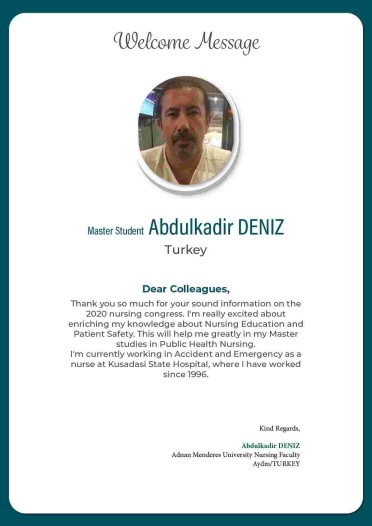
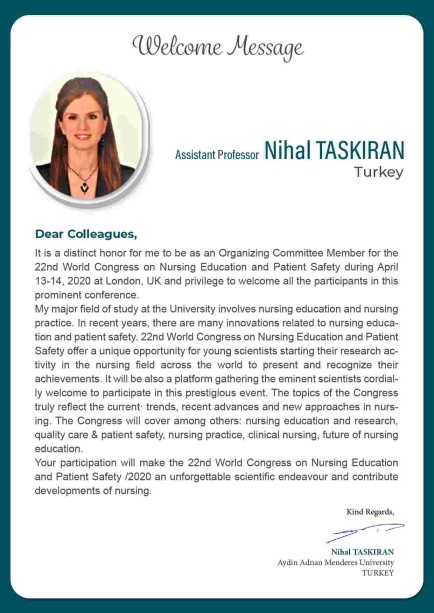
Nursing Congress | 2020 scientific committee feels esteemed delight to invite participants from around the world to join us at 22nd World Congress on Nursing Education and Patient Safety Conference schedule to be held on April, 13-14 2020 at London, UK. The Conference will primarily emphasize on the various topics related to Nursing Education, Health Care, Nursing Research, etc.
Nursing Congress | 2020 aims to discover advances in health practice, management, and education in relation to health disparities as well as a breadth of other topics through oral and poster presentations, educational workshop sessions, and influential plenary presentations. Attendees will be provided with the tools to enhance nursing education programs to make education more effective in nursing practice.
Who can attend?
Nursing Congress | 2020 brings together individuals who have an interest in different fields of nursing like psychiatric, cancer, cardiac, critical care nursing, adult care nursing and women health, legal, pediatric and emergency nursing, midwifery, public health, healthcare and medicine from practice, research, administration, policy and education. It is a forum to explore issues of mutual concern as well as exchange knowledge, share evidence, ideas, and generate solutions.
Why to attend?
Nursing conferences provides a global platform for exchanging ideas and keeps on updating about the latest innovations in nursing care and education.
Benefits:
- Global networking: In transferring and exchanging Ideas
- A Unique Opportunity for Advertisers and Sponsors at this International event
Track 1: Nursing Education and Research
Nursing Education which is provided to nursing students helps them in changing into well labile to their work by medical as well as nursing professional and to care of the patients. Nursing Education and Research are focused on the best prepare of nurses to meet health care needs of the society. Demographic, cultural, social and technological changes, as well as the continuous modifications in health services and health care organizations are a challenge for nurses, who have to provide advanced nursing practice and education. This education is furnished to Nursing college students with the aid of experienced nurses and different medical specialists who have qualified or experienced for instructional responsibilities.
Track 2: Quality Care and Patient Care:
Quality care: Now a days in rural areas most of the hospital managements are not responded properly to the patients, so that we need to improve the quality management system in the hospitals like quality of care and healthcare it means how the nurses are response on that time a doctor’s are beside manner, the atmosphere of the hospital it will be affect the people how they feel about the healthcare in the hospital.
Patient care: Patient care is very important via the treating the patient it will give the attention, time and to take care of them and well things to do. It will affect on their patient health and Patient-centered care is the practice of caring for patients (and their families) in ways that are meaningful and valuable to the individual patient. It includes listening to, informing and involving patients in their care.
Track 3: Nursing Practice:
Nursing practices are crucial and excellence in the healthcare. The nurses person who has completed their program, practices and education in her/his country. The practice of nursing requires specialized knowledge, skills and independent decision making a nurse who works in a medical practice or surgery. Practice nursing they work in GP surgeries where they provide nursing care, healthcare, and health education to patients of all ages.
- Restorative practices modify the impact of illness and disease.
- Supportive practices are oriented toward modification of relationships or the environment to support health.
Track 4: Oncology Nursing:
Oncology nursing is probably one of the most challenging and rewarding in nursing field. This education should be done effectively throughout the treatment of the disease and take care of the patient, according to the teaching style that best suits the particular patient. The nurse are educate the patients on their condition and side effect and how to prevent complication. An oncology nurse is a nursing professional who specializes in caring and treatment for people with cancer. Oncology nurses must have appropriate training in the administration, handling, side effects, and dosing of chemotherapy. Each institution will have its own policies for various chemotherapy drugs to ensure adequate training and for prevention of errors. Their practices in the association will a number of oncologic disciplines, consisting of the surgical oncology, radiation oncology, gynecologic oncology and the medical oncology.
Track 5: Adult Health Nursing:
Adult health nurses are basically nurses who provide health care services to a specific population a typically young adults, adults, and older adults. The primary objectives of the adult health nurse are to play a role in, and to help facilitate, the promotion, maintenance, supervision, and restoration of the patient health. An adult health nurse, also known as an adult health practitioner, is often responsible for more things than an ordinary nurse. In many cases, adult health nurses will operate as leaders, advocates, and those working as a adult nurses also act as educators. In addition to taking vital signs and getting medical histories, and these nurses also order tests and laboratory work and keep doctors updated on patients health. These nurses can work with patients suffering from chronic conditions and those with new or recent illnesses, injuries and diseases of the patient health.
Track 6: Cardiac Nursing:
Cardiac nursing is a work with patient those has suffer from the various condition of cardiovascular system. Most of the cardiovascular clinical nurse specialists work in the hospitals. They care for the critically ill patients, and those who are recovering from the cardiac procedures such as bypass, angioplasty/pacemaker surgery. Cardiac nurses help treat conditions such as cardiomyopathy, coronary artery disease, congestive heart failure, myocardial infarction and cardiac dysrhythmia under the direction of a cardiologist. The Cardiac nurses may also help the patients recover at home.
- Cardiac Anesthesiology
- Heart attack/Heart failure
- Cardiomyopathy
- Caring for heart transplant patients
- Health care for cardiovascular diseases
- Coronary artery disease
- Heart muscle disease (Cardiomyopathy)
Track 7: Neuroscience Nursing:
A neuroscience nurse is a nursing professional that helps patients suffering from neurological problems. This can include injuries, such as head and spinal trauma from accidents, or illnesses, such as Parkinson’s disease, meningitis, epilepsy, and multiple sclerosis. Neurological nurses will often have a hand in treating patients with neurological problems as well.
- Brain tumors
- Parkinson
- Alzheimer’s
- Encephalitis
- CNS Disorder
Track 8: Dental Nursing:
Dental thought is essential to counteract dental illness and to stay up legitimate dental and oral well-being. A dental nurse is an essential part of the dental team, helping to ensure that the patient is well cared for ans as a dental nurse it is important to be friendly, calm and efficient and have a reassuring and welcoming manner. And the role of the dental assistants should support the dental operator by typically passing the instruments during the treatment. In a dental practice you will welcome patients and provide direct support with the treatment itself:
- taking responsibility for the decontamination of instruments
- maintaining dental operating equipment
- ensuring that all relevant materials and supplies are in place
- looking after patient records – including making notes when the dentist is examining a patient
Track 9: Community and Family Nursing:
Community health nurses, sometimes called public health nurses, are registered nurses who are trained to work in public health settings such as county or state health departments, schools, jails, and businesses. Community health nurses support the health and well-being of individuals, families, groups, communities, populations and systems. They practise in health centres, homes, schools and other community-based settings.
Community nurses act as:
- Educators
- disease and injury prevention specialists
- research scientists
- community advocates
Track 10: Nursing and Patient Safety:
The nurse-to-patient ratio is only one aspect of the relationship between nursing workload and patient safety. Overall nursing workload is likely linked to patient outcomes as well. As nursing care spans all areas of care delivery, nurses are well placed to prevent harm to patients and improve the quality and safety of healthcare delivered across all settings. Nurses are at the bedside, monitoring and caring for patients 24/7. As a nurse, you learn from an early stage in your career that patient safety is a nurse’s top priority.
Track 11: Forensic Nursing:
Forensic nursing is defined as the application of the nursing process to public or legal proceedings, and the application of forensic health care in the scientific investigation of trauma and or death related to abuse, violence, criminal activity, liability, and accidents. Forensic nursing combines nursing practice and forensics in the scientific investigation of death and injury resulting from criminal activity and accidents. The specialized training that forensic nurses receive related to both the medical and legal needs of these patients drives demand for the specialty. Forensic nursing includes roles such as:
- Clinical forensic nurse
- Forensic nurse investigator
- Forensic nurse examiner
- Forensic correctional or institutional nurse
Track 12: Clinical Nursing:
Clinical Nurse Specialists are registered nurses, who have graduate level nursing preparation at the master's or doctoral level as a CNS. Nursing and a clinical nurse specialist (CNS) is an advanced practice nurse who can provide expert advice related to specific conditions or treatment pathways. They are clinical experts in evidence-based nursing practice within a specialty area, treating and managing the health concerns of patients and populations.
Track 13: Future of Nursing Education:
Nursing is unique among the health care professions in the United States in that it has multiple educational pathways leading to an entry-level license to practice. Nursing students are able to pursue three different educational pathways to become registered nurses. Nursing research and education become more focused internationally to disseminate information and benefit from the multicultural experience. These various pathways provide numerous opportunities for women and men of modest means and diverse backgrounds to access careers. Changes in nurses' roles, responsibilities, and education are:
- Improving access to care
- Promoting nursing leadership
- Transforming nursing education
- Increasing diversity in nursing
Track 14: Orthopaedic Nurse:
Orthopaedic nurses focus on musculoskeletal issues and diseases that include fractured bones, arthritis, joint replacements and osteoporosis. Orthopaedic nurses are familiar with traction, casting, mobility devices, and pain management. Orthopaedic nurses work in hospital units, offices, and outpatient care clinics. They work with a wide age range of patients and care for both men and women. They can help care for physical issues, as well as intricate disease management.
Track 15: Tele nursing and travel:
Telenursing refers to the use of information technology in the provision of nursing services whenever physical distance exists between patient and nurse, or between any number of nurses. As a field, it is part of telemedicine, and has many points of contacts with other medical and non-medical applications, such as
- Telediagnosis
- Telemonitoring
Travel nurses are unique in that they are able to move from location to location based on their contract, and interact with patients from numerous locations. Travel nurses are able to broaden their experiences both professionally and personally through their journey.
Track 16: Surgical Nursing:
A surgical nurse, also referred to as a theatre nurse or scrub nurse, specializes in preoperative care, providing care to patients before, during and after surgery. There are many different phases during surgery where the theatre nurse is needed to support and assist the patient, surgeons, surgical technicians, nurse anesthetists and nurse practitioners. Surgical nurses may practice in different types of surgery:
- General surgery
- Vascular surgery
- Surgical Oncology
Track 17: Geriatric Nursing:
A geriatric nurse, or gerontological nurse, is a type of nurse that helps care for aging and elderly individuals. A Geriatric Nurse assists doctors in taking care of the mental and physical health of older patients who are at greater risk of injuries and diseases.
Establishing a patient care plan and setting health goals. Administering medications to patients based on a care plan.
Track 18: Nursing Informatics:
Nursing informatics is a career filed. Nursing informatics is a specialists facilitate data integration, information and knowledge so that they provide better support to patients, nurses and other health care providers. Nursing informatics is a field of nursing that include nursing, computer, and information sciences to maintain and develop medical data and systems to support the practice of nursing, and to improve patient care outcomes. There are a number of career options available in this lane, including the following:
- Nursing informatics specialist
- Clinical analyst
- Clinical informatics coordinator
- Nursing informatics analyst
Track 19: Healthcare and Maternal Child Health:
Maternal and child health specialists work to improve the health delivery system through advocacy, education and research. They accomplish this by discovering and testing solutions through applied research and by developing implementing and or evaluating health programs at the local, state, national and international levels. Their well-being determines the health of the next generation and can help predict future public health challenges for families, communities, and the health care system.
Track 20: Critical Care Nursing:
Critical care nurses require a specialized set of skills since they literally deal with life-and-death matters on a daily basis. They often work in hospital ICUs. Critical care nurses can be found working in a wide variety of environments and specialties.
- General intensive care units
- Medical intensive care units
- Surgical intensive care units
- Coronary care units
- Cardiothoracic intensive care units, burns unit
- Trauma center emergency departments.
Track 21: Neonatal Nursing:
Neonatal nursing is a nursing that works with new-born infants born with a variety of problems ranging from prematurity, birth defects, infection, cardiac malformations, and surgical problems. Neonatal nurses work in neonatal intensive care units, where new-born babies who are premature or ill can receive continuous care. A few neonatal nurses may care for infants up to about 2 years of age. Most neonatal nurses care for infants from the time of birth until they are discharged from the hospital.
Track 22: Psychiatric Nursing:
Psychiatric nurses assist to the patients who suffer with mental illnesses. They work in hospitals and in-patient care facilities to ensure that patients take their medications, stay safe from harm, and attend counselling sessions. They can also work with patients who have Alzheimer’s or dementia either through in-home care or skilled nursing facilities and provide medical care to patients who have mental health issues. Psychiatric nurses work in many environments. A few common ones are:
- Hospitals
- Psychiatric hospitals
- Home healthcare organizations
- Outpatient mental health organizations
Track 23: Environmental Health Nursing:
An environmental health nurse is a nursing professional who focuses on identifying different issues in the environment that can have an impact on the health and wellbeing of those in the area. Environmental health nurses work on improving the health of an entire population instead of on caring for a single patient at a time.
Track 24: Women Health Nursing:
A Women's Health Nurse Practitioner is an advanced-practice nurse who specializes in the comprehensive care of women throughout the lifespan with emphasis on conditions unique to women from menarche through the remainder of their life cycle.
Importance of Nursing Education and Scope:
Nursing Education is the field of nursing platform to gain or share the knowledge in the new technological developments in the field of Nursing. Nurse education consists of the theoretical and practical training provided to nurses with the purpose to prepare them for their callings as nursing care and, healthcare professionals. This education is provided to nursing students by experienced nurses and other medical professionals who have qualified or experienced for educational tasks. Nursing Education development status and forecast in United States, EU, Japan, China, India and Southeast Asia. Nursing education courses that can be relevant to general nursing or to specialized areas including
- Mental health nursing
- Pediatric nursing
- Post-operatory nursing
Nurse practitioners are in demand and are to find themselves in an exceptionally friendly job market. The top-paying state for nurse practitioners is Alaska. Hawaii, California, and Oregon are also lucrative.
Market Report on Nursing Education and their top Companies’ Growth:
The Nursing Education market report includes a comprehensive analysis of the competitive landscape of this vertical. The report provides an elaborate analysis of the competitive scope of this industry by segmenting the same into companies such as
- Duke University
- Johns Hopkins University
- University of Pennsylvania
- University of California
- Columbia University
- Emory University
- Louisiana State University Health New Orlean
The health care industry is one of the world's largest and fastest-growing industries. The health care industry has several sectors that are dedicated to provide health care services to patient. A well-functioning health care system consists of a good financing mechanism, well-trained and adequately-paid workforce, reliable information upon which base decisions and policies are made, and well maintained facilities and logistics and to deliver quality medicines and technologies which are very much essential, according to the World Health Organization.
The WHO, have also estimated that globally there are 9.2 million physicians, 19.4 million nurses and midwives, 1.9 million dentists and other dentistry personnel, 2.6 million pharmacists and other pharmaceutical personnel, and over 1.3 million community health workers, and making the health care industry one of the largest segments of the workforce.
The global healthcare industry is expected to grow from $99.6 billion in 2010 to $162.2 billion in 2015, at a CGAR of 10.2% from 2010-2015.
Market Research:
The global home healthcare market size was valued at USD 305.78 billion in 2018 and is expected to the register a CAGR of 7.8% over the forecast period. Increasing cases of chronic diseases coupled with rise in geriatric population is anticipated to fuel the market growth. According an article by United Nations in 2017, elderly population accounted for nearly 13% of the global population and is anticipated to increase by 3% annually. Furthermore, elderly individuals are prone to chronic diseases and need more healthcare services, which is the anticipated to drive the market. Growing workforce pertaining to home healthcare service translates the increasing demand. As per the statistics published by the U.S. Bureau of Labor Statistics the ranks of personal care and, home care aids are anticipated to reach 13.0 million by 2020, which translates to approximately 70.0% rise from 2010.
The global market for elder care technologies should grow from $5.7 billion in 2017 to $13.6 billion by 2022 at a compound annual growth rate (CAGR) of 19.2% from 2017 through 2022.
NURSING EDUCATION SUMMIT 2019
We gratefully thank all our wonderful Speakers, Conference Attendees, Students, Media Partners, Associations and Exhibitors for making Nursing Conference 2018 Conference the best ever!
23rd Global Nursing Education & Research Conference, hosted by the Conference Series LLC LTD was held during September 16-17 2019 Tokyo, Japan based on the theme “Innovative Ideas and Approaches in Nursing Education”. Benevolent response and active participation was received from the Organizing Committee Members along with Scientists, Researchers, Students and leaders from various fields of Nursing and Healthcare, who made this event a grand success.
The meeting reflected various sessions, in which discussions were held on the following major scientific tracks:
- Nursing Education and Research
- Nursing Credentials and Certifications
- Modernization in Nursing Education
- Advanced Registered Nurse Practitioner
- Paediatric & Neonatal Nurse Practitioner
- Cardiovascular Nursing
- Nursing Informatics
- Nursing Practice
- Clinical Nursing Research
- Innovations in Nursing Education
- Onco-Care Nurse Practitioner
- Psychiatric-Mental Health Nursing
- Geriatric Nursing
- Disaster Nurse Practice
- Licensed Practical Nurse
- Advanced Nursing Practice
Conference Series Group offers it’s heartfelt our eminent personalities who supported the conference by facilitating the discussion forums. Conference Series also took privilege to felicitate the Keynote Speakers, Organizing Committee Members, Chairs and Sponsors who supported this event.
With the grand success Nursing Congress | 2020, Conference Series LLC LTD is proud to announce the “22nd World Congress on Nursing Education & Patient Safety” to be held during April 13-14, 2020 London, UK.
Conference Highlights
- Nursing Education and Research
- Quality Care and Patient Care
- Nursing Practice
- Oncology Nursing
- Adult Health Nursing
- Cardiac Nursing
- Neuroscience Nursing
- Dental Nursing
- Community and Family Nursing
- Nursing and Patient Safety
- Forensic Nursing
- Clinical Nursing
- Future of Nursing Education
- Orthopaedic Nurse
- Tele nursing and travel
- Surgical Nursing
- Geriatric Nursing
- Nursing Informatics
- Healthcare and Maternal Child Health
- Critical Care Nursing
- Neonatal Nursing
- Psychiatric Nursing
- Environmental Health Nursing
- Women Health Nursing
To share your views and research, please click here to register for the Conference.
To Collaborate Scientific Professionals around the World
| Conference Date | August 24-25, 2020 | ||
| Sponsors & Exhibitors |
|
||
| Speaker Opportunity Closed | |||
| Poster Opportunity Closed | Click Here to View | ||
Useful Links
Special Issues
All accepted abstracts will be published in respective Our International Journals.
- Journal of Nursing & Care
- Advanced Practices in Nursing
- Global Journal of Nursing & Forensic Studies
Abstracts will be provided with Digital Object Identifier by


